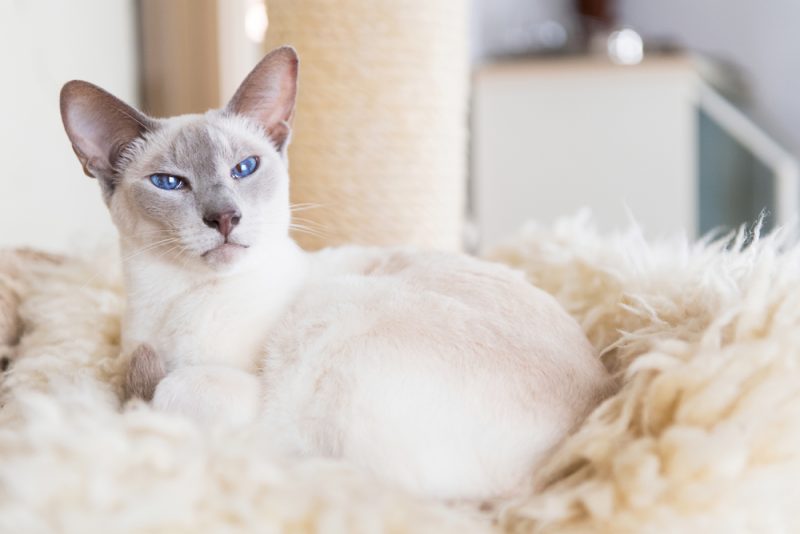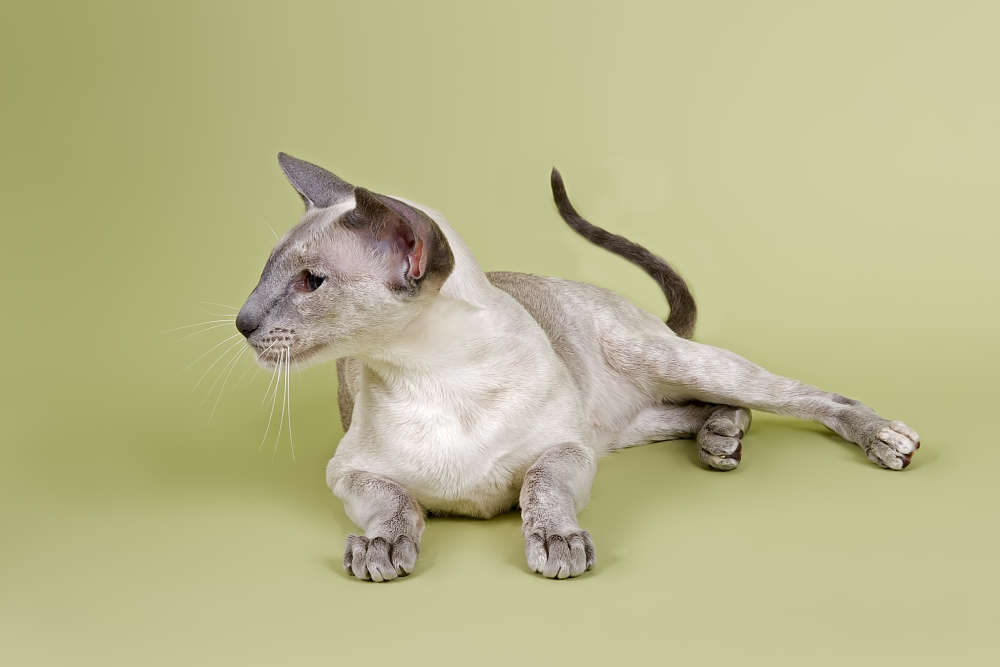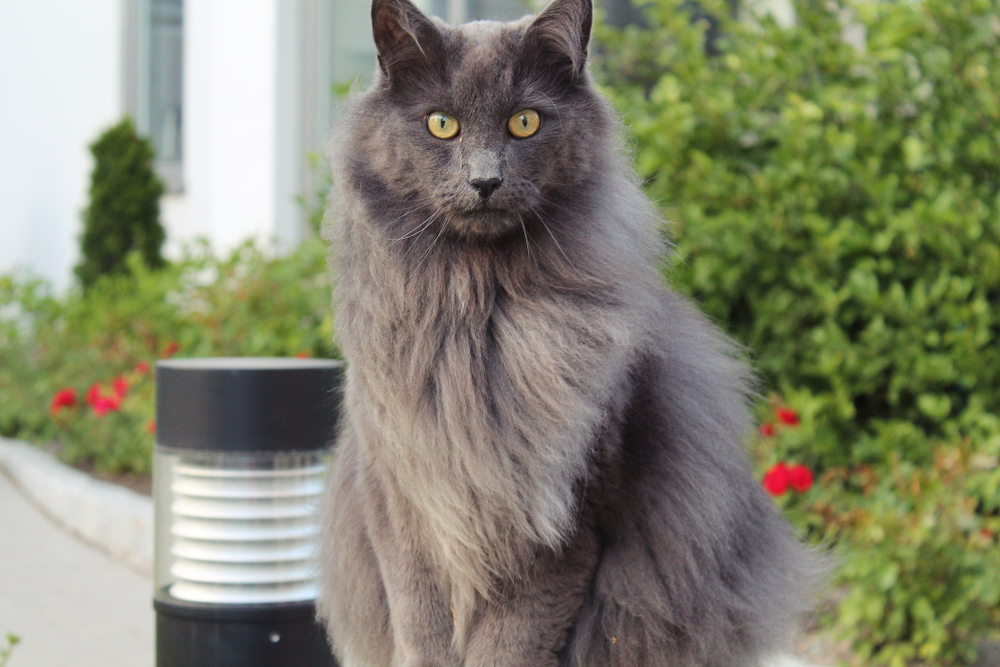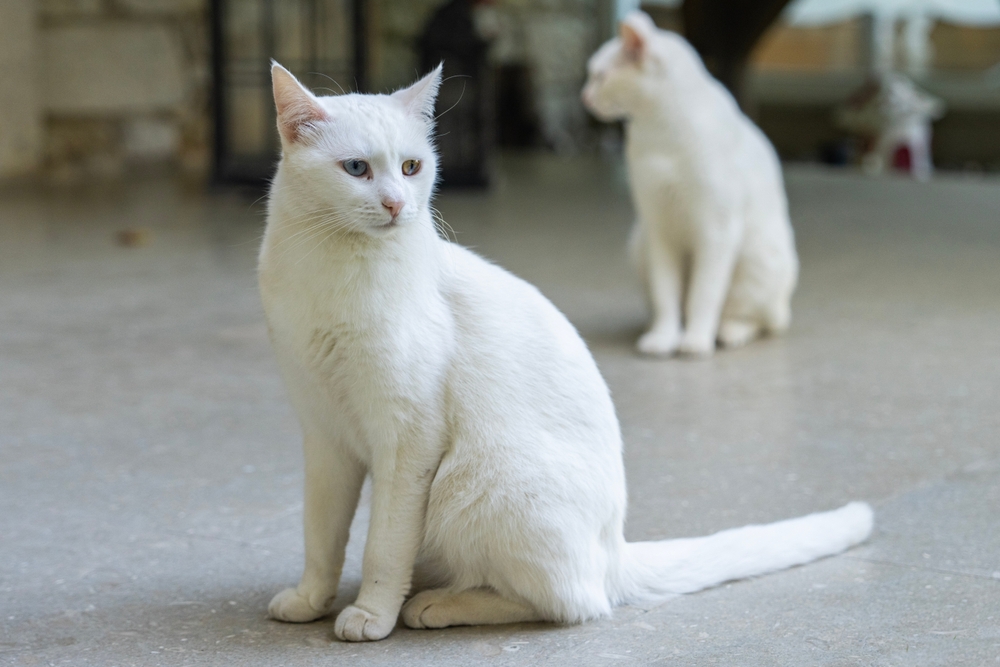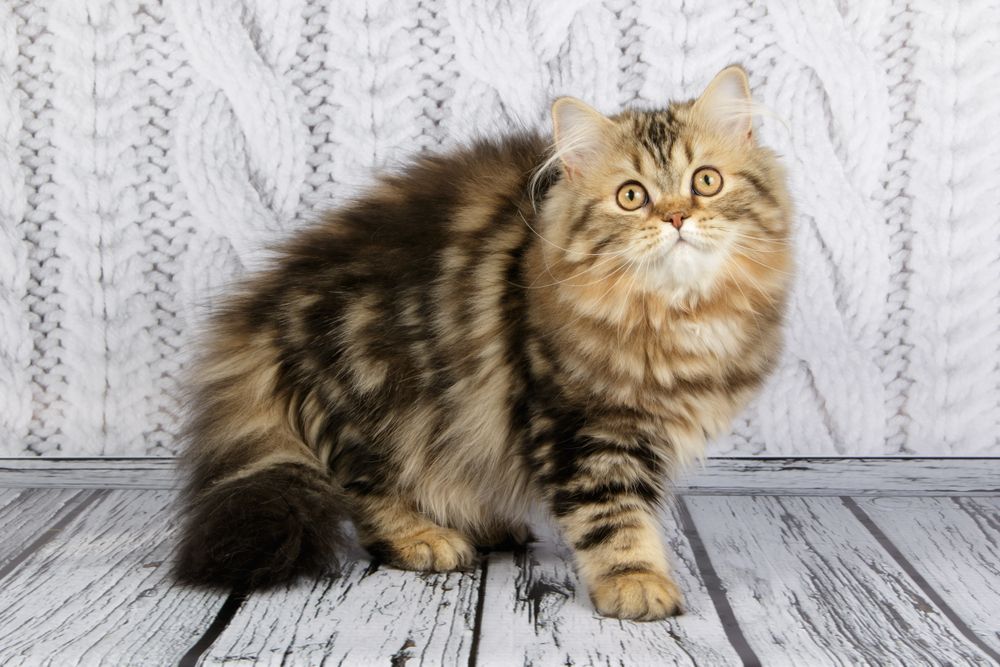Click Below to Skip Ahead
The Lilac Point Siamese is one of the most well-known Siamese breeds, revered for their unique and striking lilac-grey color-point coat. They are one of four types of Siamese and have become one of the most popular due to their subtle coloration that varies between individuals. That was not always the case; the Lilac Point Siamese struggled in shows and was considered a watered-down version of Blue Points.
Breed Overview
Height:
8–10 inches
Weight:
8–12 pounds
Lifespan:
15 to 20 years
Colors:
Diluted chocolate point with pink undertones on a white body
Suitable for:
Families, seniors, singles
Temperament:
Energetic, friendly, affectionate, loyal, attentive, vocal
They are one of the rarer Siamese colorations, along with Blue Points, Chocolate Points, and Seal Points. Like all Siamese cats, Lilac Point Siamese are incredibly vocal and love a good play session with their owners. Their friendly and playful nature makes them a popular family feline.
Lilac Point Siamese Characteristics
Lilac Point Siamese Kittens
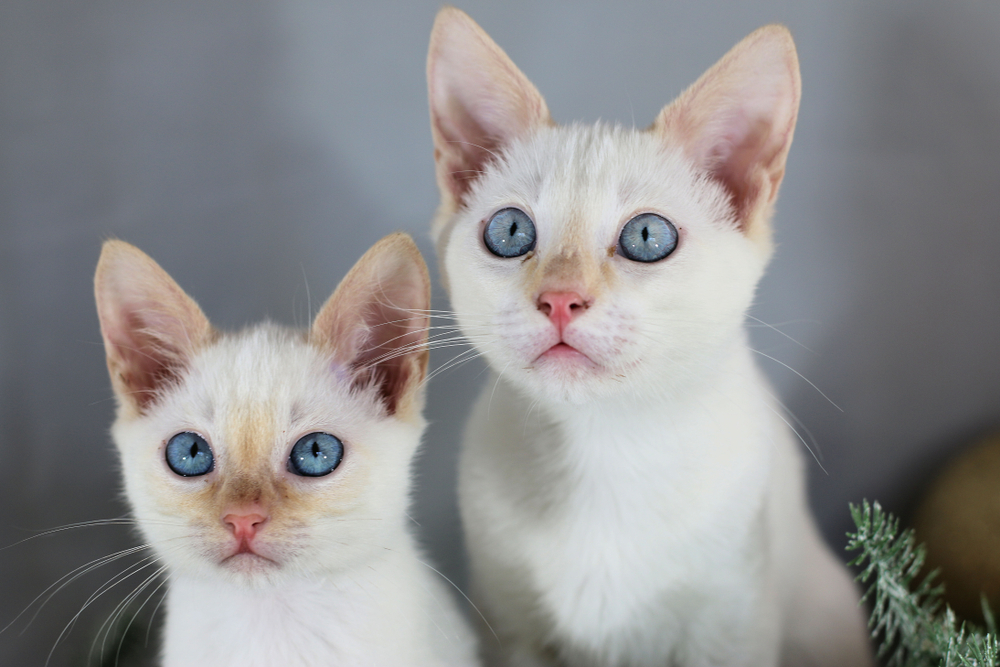
Before getting a Siamese kitten, there are a few important factors to consider. Firstly, Siamese cats are extremely vocal. This can be both adorable and infuriating, and Siamese cats are known for their almost constant meowing and vocalizing. Not only that, but their vocalizations are also loud and even piercing at times, so you’ll need to be prepared for the opposite of the typical cat behavior of quietly keeping to themselves.
Another unique trait of Siamese cats is their affection; if you want a cat that keeps to itself, the Siamese is probably not for you. They are highly affectionate and love to be held and fussed over. Most Siamese owners will also tell you that Siamese cats are best kept in pairs. They become easily bored and don’t enjoy being alone, so a friend will keep them entertained and out of mischief.
Lastly, while most breeds are challenging to train, Siamese cats are particularly difficult. Although they are highly intelligent and eager to please their owners, they are independent and can be stubborn
Temperament & Intelligence of the Lilac Point Siamese
Like all Siamese cats, the Lilac Point Siamese is a curious, playful, and highly affectionate cat that loves to be close to their owner. These traits and their unique and almost constant vocalizations make them a popular family feline. They are almost dog-like in many of their characteristics and don’t follow the traditional model of cats that keep to themselves. Siamese cats will follow you around the home, sit on your lap at every opportunity, and proceed to tell you all about their day!
Of course, these traits make them a fairly demanding breed, and they need constant attention and affection. They do not enjoy being left alone for long periods, and if you are away from home frequently, you should consider the advice of dozens of Siamese owners and get a pair to keep each other company.
Siamese cats are athletic and playful, which, combined with their intelligence, makes for a fun housemate. They need plenty of mental stimulation, and you’ll need to invest in a few toys or a cat tree to keep them entertained when you are busy or at work. Siamese cats are one of the most loyal and loving cat breeds around, and it’s no wonder they have become one of the most popular cats on the planet.
Are These Cats Good for Families? 👪
The Lilac Point Siamese is a great family cat. They are abundantly friendly, playful, and loyal and make great playmates for children. They love to be around people more than most other breeds.
Does This Breed Get Along With Other Pets?
Siamese cats are highly social, love human interaction, and don’t enjoy being alone. This makes them far more likely to make friends with other family pets, like dogs, than enemies. While they may see smaller pets like rodents as prey (as will almost all cats), Siamese cats are generally friendly to other household pets.
Things to Know When Owning a Lilac Point Siamese
Food & Diet Requirements 
Like all cats, your Lilac Siamese cat’s diet should consist of a large amount of healthy, animal-based protein and essential vitamins and minerals. Siamese cats need a diet that can keep up with their energetic lifestyle. Cats cannot easily digest plant-based food and are obligate carnivores, so it makes sense that their diet should consist of primarily animal-based products.
Cats need the essential amino acids only available in meat, as they cannot readily absorb the amino acids found in plants as dogs and humans can. A critical example of these amino acids is taurine; it’s an essential amino acid that is vital for heart and eye health. The food you feed your Siamese should be high in protein, but you need to be sure that the protein is sourced from animals like chicken and fish.
Healthy fats are also essential for cats since they give them essential energy—almost twice as much as protein—and help absorb essential nutrients. High-quality dry kibble is great because it is convenient and has all the nutrients and minerals that your cat needs to thrive.
However, you need to ensure that the protein and fat sources are animal-based and that animal-based protein is the first listed ingredient. Wet food is also an ideal option to supplement the dry diet since it contains plenty of moisture to keep your Siamese hydrated.
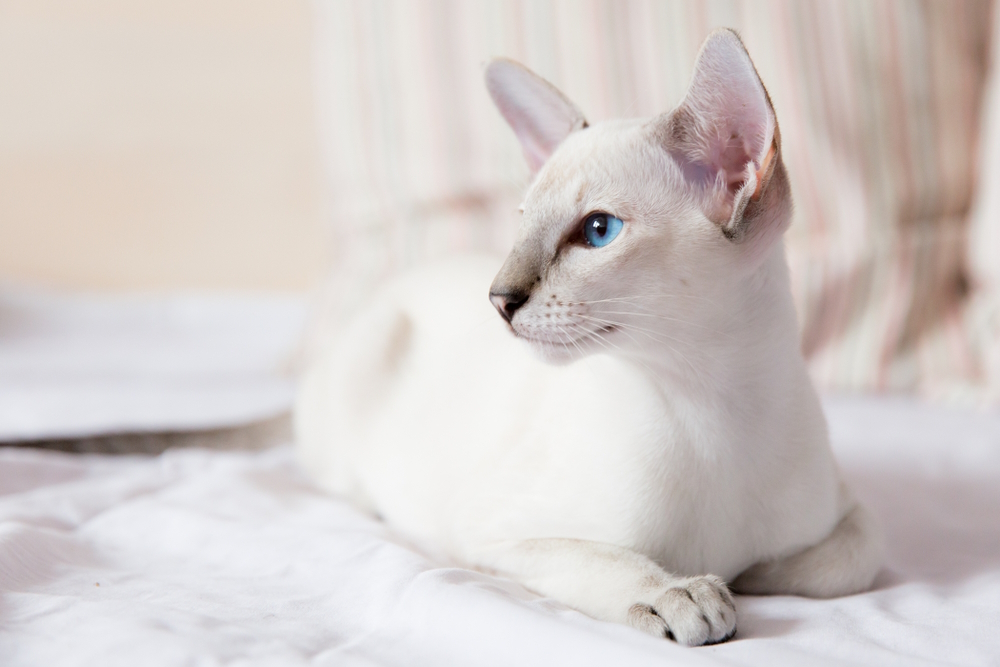
Exercise 🐈
The Lilac Point Siamese is an energetic cat that loves to play, and cat trees and scratching posts are ideal for keeping your furniture intact. Siamese are fairly active all on their own, so you don’t need to dedicate much time to exercising them. Around 30 minutes a day of interactive play is plenty to keep them stimulated physically, and including toys will help them stay mentally stimulated.
Cats that are strictly indoor animals require more exercise than outdoor felines, and cat trees and several toys can keep them fit and entertained. Siamese cats will also benefit significantly from having a friend to play with.
Training 🧶
According to some owners, siamese cats are notoriously difficult to train, while others make the case that their eagerness to please and high intelligence make training a breeze. Either way, dedication, time, consistency, and patience are vital for successful training. We also recommend beginning training as early as possible to avoid bad habits.
House training is the most important part of training and should begin on day one, especially for indoor cats. Placing their litter box in a private and safe place is the key to getting them to use it successfully, and they will likely pick the habit up quickly if given a peaceful, private place to do their business.
Because Siamese cats are so similar to dogs in temperament and behavior, positive reinforcement training is an ideal methodology. Be gentle but firm, and reward good behavior with treats and affection.
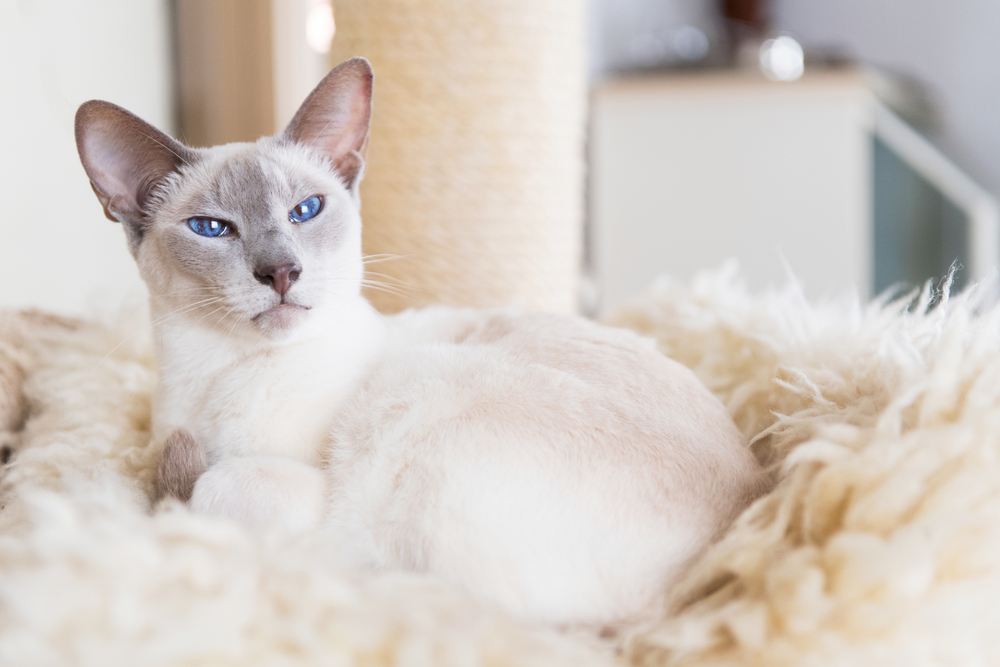
Grooming ✂️
Grooming a Lilac Point Siamese cat’s short coat is fairly straightforward, and brushing a couple of times a week is perfect. Siamese cats are low-shedding, great for owners with allergies, and easy to care for. Depending on your cat’s activity levels, they may need occasional claw trimming. If you provide them with a scratching post or they are outdoors frequently, claw trimming shouldn’t need to be done as often.
Health and Conditions 🏥
The Lilac Point Siamese is a healthy breed with no notable genetic diseases, but there are a few issues that you’ll need to keep an eye out for.
- Progressive retinal atrophy. Siamese cats are prone to this genetic condition, which may eventually lead to blindness in some cases.
- Systemic amyloidosis. This is a condition where the protein build-up in various organs may stop them from functioning correctly and result in organ failure.
- Hip Dysplasia. This condition is caused by the abnormal development of the hip joint and is fairly common in Siamese cats. It cannot be cured but can be successfully managed.
- Siamese cats are particularly prone to asthma and bronchial disease, and some have kinked tails and squinted or crossed eyes.
- Obesity
- Asthma
- Bronchial disease
- Kinked tails
- Crossed eyes
- Cancer
- Hip dysplasia
- Progressive retinal atrophy
- Systemic amyloidosis
Male vs. Female
In general, there is little difference between male and female Siamese cats. Many owners claim that males are more affectionate, but that isn’t as relevant with the Siamese, considering the breed is already so friendly. Of course, if you want a cat that is slightly more reserved, a female Siamese may be the way to go.
Neutering males and spaying females are highly recommended; this will prevent males from wandering and unwanted pregnancies in females.

3 Little-Known Facts About the Lilac Point Siamese
1. The Siamese Is an Ancient Breed
While the Siamese cat’s true origins are challenging to pinpoint, we know that they most likely originated in Thailand and are one of the oldest recognized breeds of oriental cats. Siamese cats only made their way to the United States in the late 19th century, but some ancient Thai documents indicate that the breed existed as far back as the 14th century.
2. They Were Considered Anomalies at First
The color of the Lilac Point Siamese was not always held in such high regard, and they were initially considered watered-down versions of the Blue Point. Breeders and enthusiasts finally caught on, and the Lilac Point was officially recognized in 1955.
3. Siamese Cats Are Guinness World Record Holders
Most Siamese cats typically give birth to four to six kittens, but that all changed in 1970. A Siamese/Burmese cross gave birth to 19 kittens and claimed a Guinness World Record that still stands today. Unfortunately, four were stillborn, but it remains a remarkable feat nonetheless.
Final Thoughts
The Lilac Point Siamese is one of the most loving and affectionate cat breeds. The cats are dog-like in their temperament and behavior and are known to follow their owners around. They are highly vocal cats and will come and curl on your lap and tell you all about their day. Curled up on their owner’s lap is the spot they love most, and if you want a quiet cat, the Lilac Siamese may not be the best choice for you.
Lilac Point Siamese cats are an ideal choice for families due to their playful and affectionate nature, and if you want a cat that has an almost endless amount of affection and attention to give, the Lilac Point Siamese is a great choice!
Next on your reading list:
- Most Popular Cat Breeds (With Pictures)
- Interesting Facts About Seal Point Siamese Cats (With Pictures)
Featured Image Credit: Ivonne Wierink, Shutterstock


